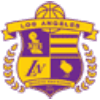It’s much too late for a turning point in the Los Angeles Lakers 14-51 season, but it could be the perfect time to start the unofficial process of attracting free agents. For the Lakers, that starts with proving progression and showcasing future potential to players around the league.
When the Lakers drafted D’Angelo Russell with their No. 2 pick in the 2015 NBA Draft, it was with the intention that he would be a crucial cornerstone to the franchise finding success in a new era of basketball for years to come. An era without Kobe Bryant and a style of play transitioning to a faster-paced, guards-driven league.
Granted, Lakers general manager Mitch Kupchak also cautioned upfront that results would take time, but that their vision involved Russell and Jordan Clarkson in the future backcourt for “10-12 years,” as he told Sirius XM NBA Radio.
Then, the Lakers started 3-21 and the debut of the future was off to a rocky introduction. An introduction that saw a 19-year-old rookie and sophomore forward Julius Randle demoted to the second unit after 20 games into the season.
But, the Lakers brass continued to voice their faith in the young core and a day before February’s NBA trade deadline, Kupchak stressed their priority shift to player development.
“Make sure our young players develop,” Kupchak said of their priority to end the season.
Four days later, head coach Byron Scott reinserted Russell into the starting lineup to develop alongside Clarkson and Randle, and the wheels started to turn. Five games in, the rookie goes off for 39 points. Then, Russell and Clarkson outscored Steph Curry and Klay Thompson to upset the Golden State Warriors. Against Orlando, Russell, Clarkson and Randle combined for 74 points. And suddenly, their collective success is starting to turn some heads.
For the Lakers, this could mean players around the league starting to take notice.
“I think most players that are free agents will probably look at our roster and look at our young guys and see if those guys developed over the year and see what their type of potential is before they make a (free agency) decision,” Scott told LakersNation.com on Wednesday. “My job right now is to keep trying to develop these young guys, keep them playing well, keep them playing together.”
It’s been nine games since Russell’s return and he’s averaging 20.7 points, 4.8 assists and 3.1 rebounds in that span while shooting 48.2 percent from both the field and beyond the arc. In February, Kupchak said he had a conversation with the young players to let them know how important it was to leave 100 percent out on the floor and alluded to how their performance impacts summer decisions.
“Show me your best, so it helps us during the off-season when it comes to evaluating our needs,” Kupchak said of the message he delivered to the young core.
It would sound like Russell received the message.
“If we keep playing at a high level, sky’s the limit, and that could probably dictate who wants to come here,” Russell expressed Wednesday. “Or, feeling like we don’t need to bring this guy, because we’ve got such and such or something like that, so I feel like we can play a certain part. But, I don’t really worry about stuff like that, because I feel like it could take my mind off what’s important.”
As for Clarkson, the second-year standout has been arguably the Lakers best player this season, averaging 15.9 points (second only to Bryant) and 4.0 rebounds in 32.4 minutes per game this season. And, over the last 12 games, Jordan Clarkson has strung together seven 20+ point outings.
Clarkson isn’t sure whether free agents around the league have been noticing their recent success (note: Clarkson will be a restricted free agent himself this summer), but he hopes they’re watching.
“I don’t know. I would think so,” Clarkson said of their impact on free agency. “I feel like everybody watches everybody in the NBA. Hopefully, they are watching and they see some good stuff, but at the same time, we’re trying to grow on our own with us young guys.”
Of course, the mixture of factors that plays into a free agent’s decision involves much more than simply seeing the progress and potential of a young core to build around. But, with negotiations not allowed to take place until July 1st, it’s always good to get ahead in the game, and this could be one.




